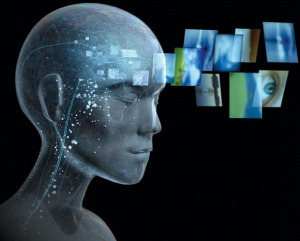Anthropologists used to say that the human brain represents “the pinnacle of creation.” No one voices such blatantly anthropocentric things anymore. Human egocentrism now takes subtler forms, such as “for all we know, we may be the only sentience in the Galaxy, maybe even in the Universe.”
 Hubris is hubris. I think we were better off with the pinnacle talk. The Milky Way is a very big place, and the universe incomprehensibly large.
Hubris is hubris. I think we were better off with the pinnacle talk. The Milky Way is a very big place, and the universe incomprehensibly large.
On this planet, the human brain is the only brain with the capacity to be consciously aware of the sacredness that imbues nature and the universe. Why then is “bringing the otherness” so rare?
Most scientists would not have a problem with the first part (the human brain is the only brain on earth with the capacity to be aware that it is aware), but many would take issue with the second (that sacredness imbues nature and the universe).
But I propose that this line of thinking points not only to the resolution of what used to be called ‘the riddle of man,’ but also to the resolution of the divide between the scientific and religious minds.
If one at least entertains the notion that in silent awareness of the inseparable wholeness of nature and the cosmos there is also awareness of intrinsic holiness, then the question is left open. After all, the two words–wholeness and holiness–have the same root. Why shouldn’t the two things they point to belong to the same actuality?
Beyond this insight however, there’s an unresolved paradox. The adaptation of symbolic thought that gives us humans the capacity for conscious awareness of the numinous is also an enormous impediment to the awakening of complete awareness.
So if our brains are exapted for enlightenment, why would nature and cosmic intelligence present would-be human beings with such a riddle, and so high a bar?
Exaptation “is a term used in evolutionary biology to describe a trait that has been co-opted for a use other than the one for which natural selection has built it.” The feathers of birds is the default example. They initially evolved for temperature regulation, but were later ‘exapted’ for flight.
Is enlightenment within the human being analogous to feathers on birds? Many would say the whole notion is for the birds. But I feel the evolution of ‘higher thought’ is a pre-adaptation to illumination, just as feathers were a pre-adaptation to flight in birds.
I realize I’m wading into the murky waters of teleology here. Teleology is the idea that there is an intrinsic intent and direction in evolution. It’s become taboo in science. But philosophers aren’t barred from considering the conundrum of consciousness from this perspective.
I don’t feel anyone or anything is directing this process, as ‘intelligent design’ proponents purport. They are attempting to uphold the separate creation of species, especially man, according to a literal translation of the Genesis story. That’s frankly absurd, though I know some smart people who have wasted their lives and good brains trying to disprove the fact of evolution.
What I’m saying is that the evolution of symbolic thought, through the random but intrinsically directional processes of evolution, brought the potential for illumination, even as it is also a tremendous impediment to it.
Since humans are capable of awakening, and since consciousness as we know it has become so spiritually and emotionally stultifying (ending in the death wish of global terrorism as well as the fragmentation of nature to the breaking point), we humans have no choice but to awaken if we’re to survive and thrive as a species.
That means there’s a tremendous urgency for a conscious transmutation of the human species. Can the human brain undergo such a transmutation at this point in human civilization?
this point in human civilization?
Human nature hasn’t changed in 100,000 years, not since the cognitive leap that ushered in modern humans. Our experience with the intractability of human nature has produced a belief in its immutability. But everything changes sooner or later, for the better, or as ‘human nature’ is currently going, for the worse.
So there has to be a spiritual leap, creating veritably a new species. What kindles it?
Watching thoughts and emotions as they arise halts the habitual reactions of judgment, suppression and resistance. Taking the time and making the space to passively observe the movement of thought/emotion in the mirror of nature gathers inclusive, undivided and undirected attention.
When attention burns with sufficient intensity, psychological thought (also known as the monkey mind) naturally and effortlessly quiets. Therefore attention (not concentration) ends the darkness of psychological thought and transmutes consciousness as we know it.
At the right time (and if not now, when?) if even a small minority of people brought about radical change within themselves in this non-way (called ‘via negativa’), it would change the course of humanity.
Martin LeFevre

